高中英语人教版必修1 Unit 3 Travel journal单元课件(88张ppt)
文档属性
| 名称 | 高中英语人教版必修1 Unit 3 Travel journal单元课件(88张ppt) |
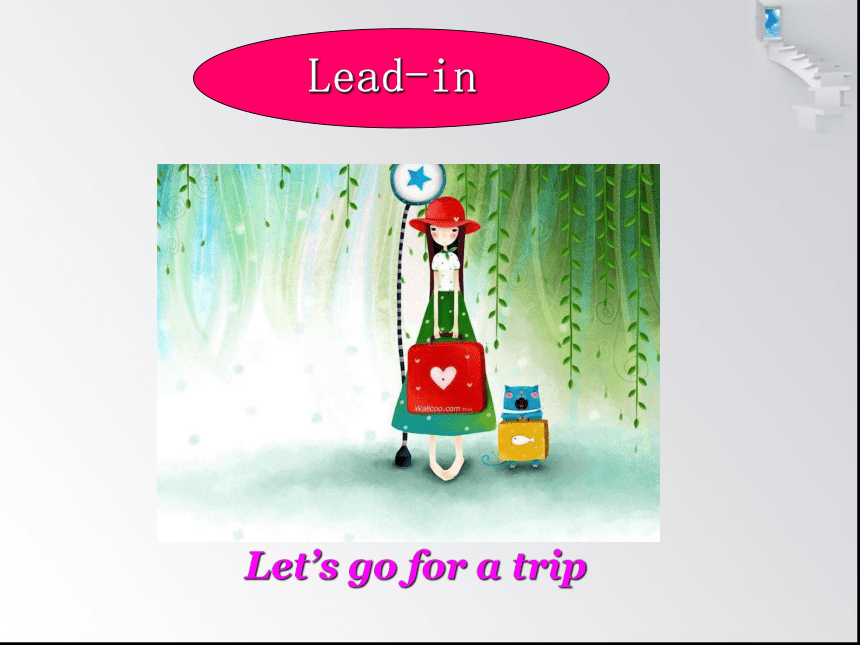
|
|
| 格式 | zip | ||
| 文件大小 | 3.6MB | ||
| 资源类型 | 教案 | ||
| 版本资源 | 人教版(新课程标准) | ||
| 科目 | 英语 | ||
| 更新时间 | 2020-01-30 00:00:00 | ||
图片预览


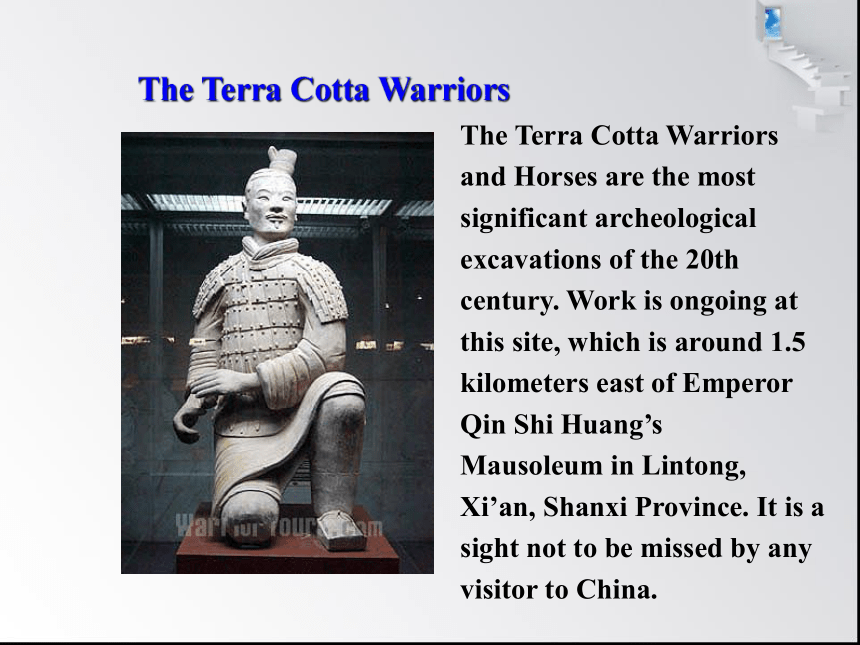
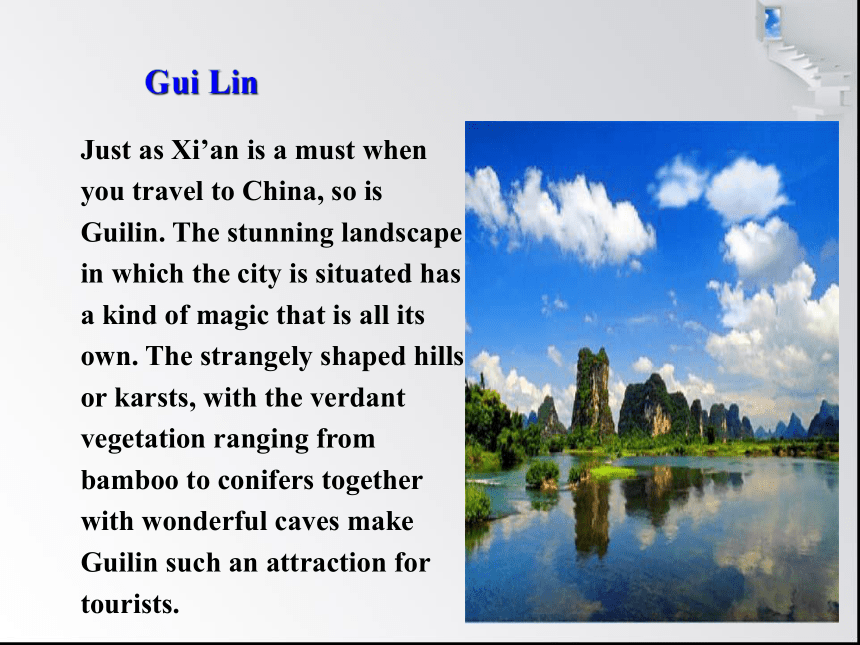
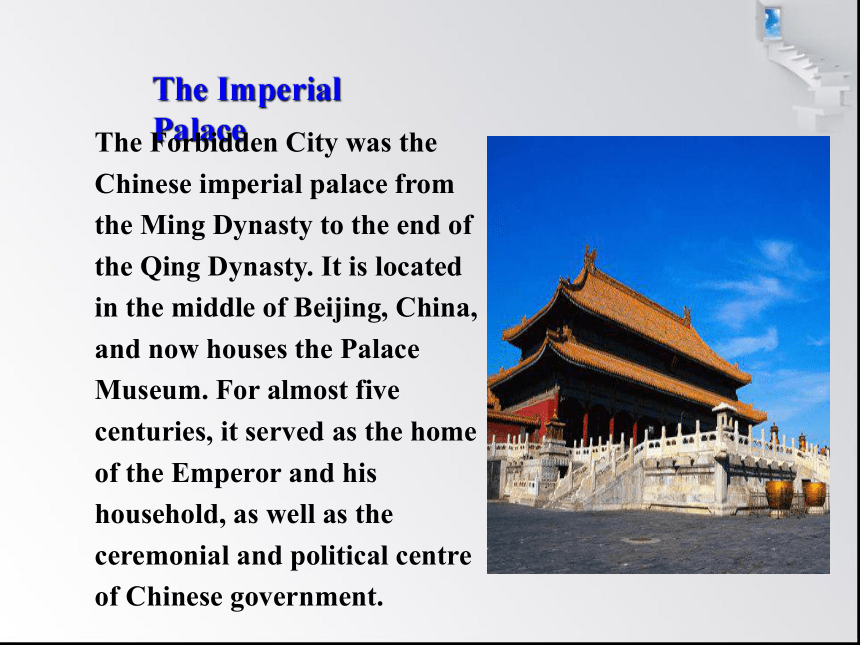
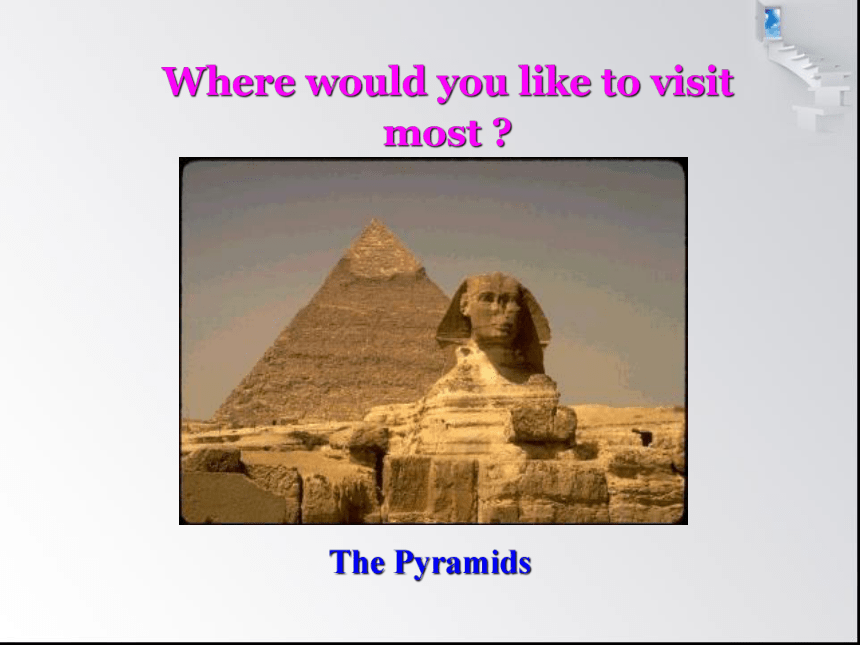
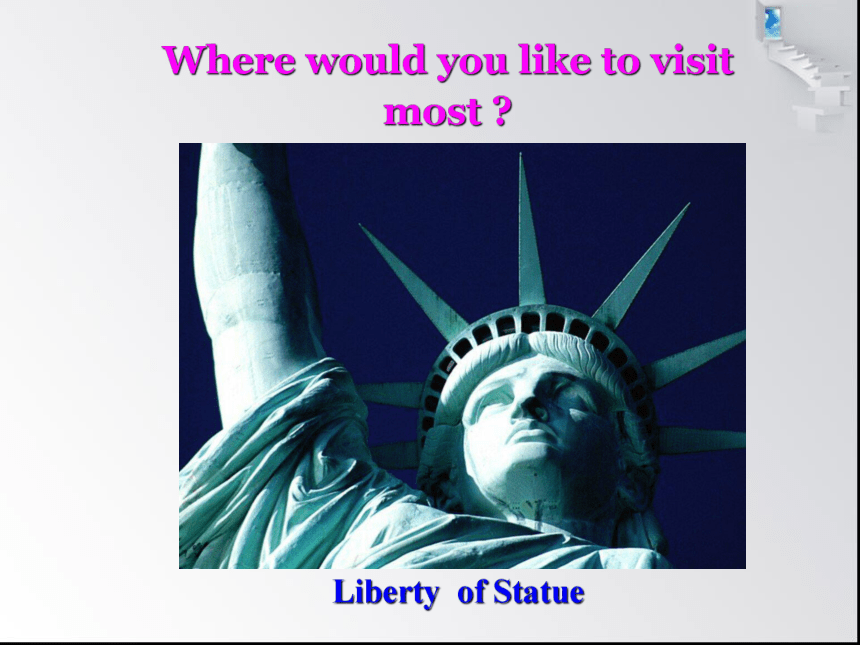

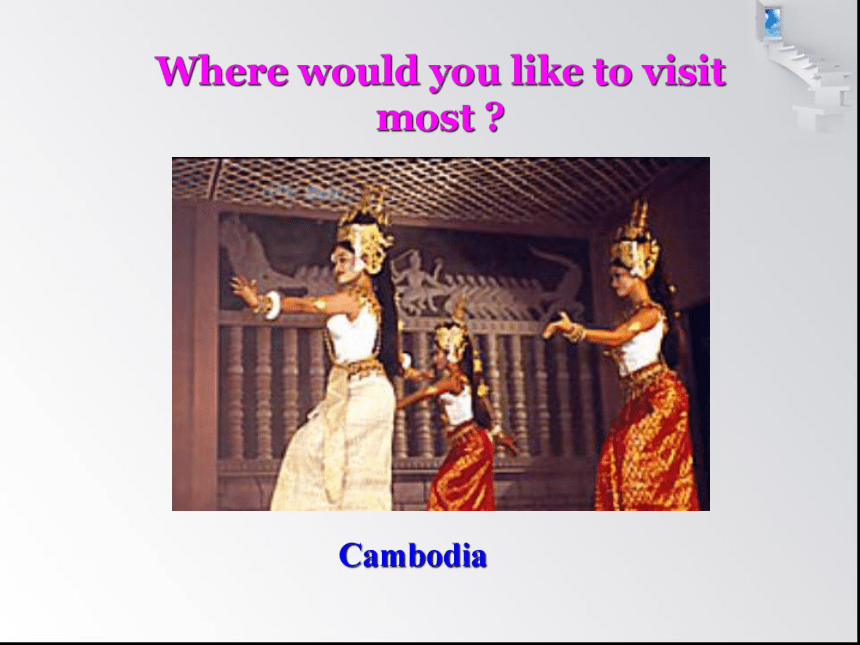
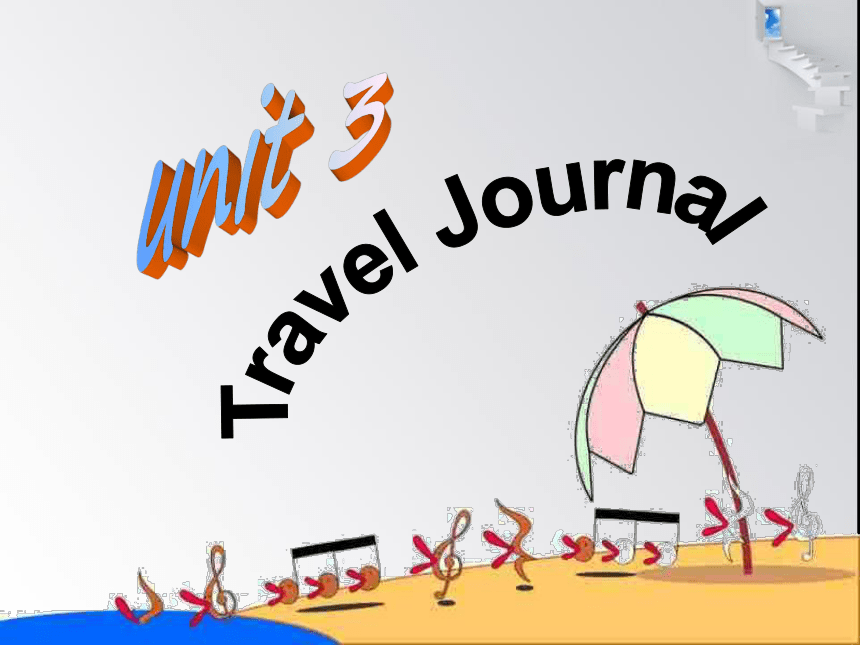
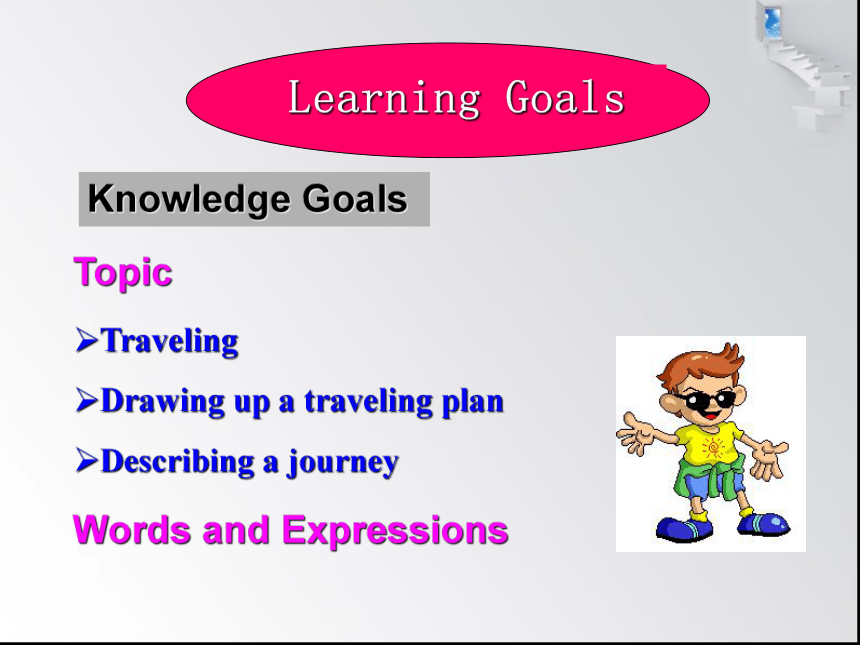
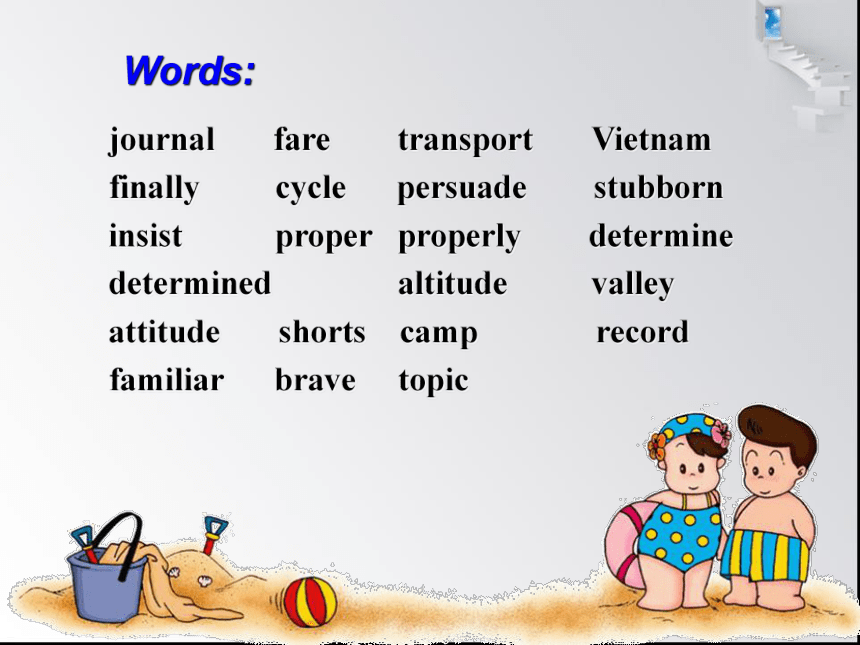
文档简介
(共88张PPT)
Let’s go for a trip
Lead-in
Have you ever been to
these places?
The West Lake
The Great Wall
The Terra Cotta Warriors
Huang Shan
Gui Lin
The Imperial Palace
The Terra Cotta Warriors
The Terra Cotta Warriors and Horses are the most significant archeological excavations of the 20th century. Work is ongoing at this site, which is around 1.5 kilometers east of Emperor Qin Shi Huang’s Mausoleum?in Lintong, Xi’an,?Shanxi Province. It is a sight not to be missed by any visitor to China.
Gui Lin
Just as Xi’an is a must when you travel to China, so is Guilin. The stunning landscape in which the city is situated has a kind of magic that is all its own. The strangely shaped hills, or karsts, with the verdant vegetation ranging from bamboo to conifers together with wonderful caves make Guilin such an attraction for tourists.
The Imperial Palace
The Forbidden City was the Chinese imperial palace from the Ming Dynasty to the end of the Qing Dynasty. It is located in the middle of Beijing, China, and now houses the Palace Museum. For almost five centuries, it served as the home of the Emperor and his household, as well as the ceremonial and political centre of Chinese government.
Where would you like to visit most ?
The Pyramids
Where would you like to visit most ?
Liberty of Statue
Where would you like to visit most ?
Triumphal Arch
Where would you like to visit most ?
Cambodia
unit 3
Travel Journal
Traveling
Drawing up a traveling plan
Describing a journey
Learning Goals
Knowledge Goals
Topic
Words and Expressions
journal fare transport Vietnam finally cycle persuade stubborn insist proper properly determine determined altitude valley attitude shorts camp record familiar brave topic
Words:
one-way fare 单程票 round-trip fare 往返graduate from 从…毕业 care about 忧虑,关心?
care for喜欢,照顾? care to do愿意/同意做某事give in (v.t) 上交 give in (to) 投降;屈服;让步give up 放弃?????????? ?give up doing/sth
as usual 像往常一样??????? at midnight 午夜
at an altitude of 在…的海拔上
change one’s mind 改变主意
to my mind = in my opinion
make camp 野营,宿营
make up one’s mind to do 决心干某事
Expressions:
Expressing good wishes
Expressing farewells
Talking about future plans
现在进行时表示将来时
Functional Items
Grammar
Master the travel related knowledge and language skills.
To develop the interests about tourism and the ability to cross-cultural communication.
From this unit, develop students' interests about traveling.
The ability to express good wishes and farewells.
Ability Goals
Emotion Goals
Know how to make a travel plan
A basic knowledge about different cultures.
From this unit ,develop the students’ comprehensive language abilities.
Important and Difficult Points
Important Points
Difficult Points
Have you ever been to these places?
How do you get there?
White House
New York
Warming up
Have you ever been to these places?
How do you get there?
Suzhou Gardens
Have you ever been to these places?
How do you get there?
Taishan (Mountain)
Have you ever been to these places?
How do you get there?
Hukou Waterfall
Have you ever taken these?
——Do you know their advantages and disadvantages?
Transport Advantages Disadvantages
very cheap, efficient for short journeys,
go the small towns and cities conveniently
takes longer than the train or plane, no meals, uncomfortable
cheaper than the
airplane, views along the road arrive at the centre
of the cities
takes longer than the airplane
no meals, crowded
cheaper than plane
comfortable,
accommodation and meals
entertainment
more expensive than the train or bus
not convenient for visiting inland places
quick, time-saving,
comfortable
meals
expensive,
airports are far from the centre of the cities.
Names of river Location
Mekong river
Seine
Nile
Gongo
Amazon
Mississippi
Thames England
Egypt
Central Africa
US
France
China
Brazil
The great rivers in the world
Many people live beside a river. How do they make use of it in their daily life?
The world has many great rivers. Do you know what they are?
If you could follow the only one route, which one will you choose?
Pre-reading
1. First listen to the tape, then answer the questions:
Which river does Wang Wei and Wang Kun want to follow ?
Who put forward the plan first?
Look at the map on page 18, list the countries that the Mekong River flows through.
2. Listen to the passage
Reading
3. Read for the first time, then do
the following detail questions.
(1) Wang Kun and Wang Wei’ idea of a good tripe is to take a long bike trip.
(2) Wang Kun planed the trip.
(3) The source of the river is in Yunnan Province.
(4) The river enters the South China sea.
(T)
(F)
(F)
(T)
(5) Just because the temperature, the source of the river is not a glacier.
(6) According to the passage, we can see Wang Kun is a enthusiasm, critical, sensible girl.
(F)
(T)
Read the passage for the second time, try to understand the sentences on page 19, exercise 2. Then summarize the attitudes of Wang Wei and Wang Kun to this long trip. And give your attitude.
Wang Wei ’s attitude Positive to the trip. She wants to organize it as it was her idea.
Wang Kun ’s attitude Less positive to the trip as he wants to organize it and thinks he can do that better than his sister.
What about you ?
The Mekong River (known in Tibet as Dza-chu, China as Lancang river and Thailand as Mae Nam Khong), is a major river in southeastern Asia. It is the longest river in the region. From its source in China's Qinghai Province near the border with Tibet, the Mekong flows generally southeast to the South China Sea, a distance of 4,200 km (2,610 mi).
Mekong river
Background
The Mekong crosses Yunnan Province, China, and forms the border between Myanmar (Burma) and Laos and most of the border between Laos and Thailand. It then flows across Cambodia and southern Vietnam into a rich delta before emptying into the South China Sea. In the upper course are steep descents and swift rapids, but the river is navigable south of Louangphrabang(琅勃拉邦) in Laos.
Background
Mekong
Map
Background
China
Laos
Thailand
Cambodia
Vietnam
South China Sea
Myanmar
The natural resource management issues and priorities differ in each of the countries and the level of development and populations vary significantly. In north-east Thailand, with over 20 million people, the water resources are virtually fully developed and problems are emerging associated with Stalinization of arable lands as result of over-clearing of native vegetation and poor irrigation, soil erosion, and declining water quality in the rivers and streams.
Background
In Laos, with 5 million people and a much poorer country from a GDP perspective, the water resources are largely undeveloped. Cambodia, with 10 million people, is recovering from decades of war, and in the Mekong delta some 20 million Vietnamese live on some of the most highly productive agricultural land in the world.
Background
explanations
Insist的用法
1.意思是“坚持要”表示命令、要求,其后之宾语从句要用虚拟式动词原形 或者“should + 动词原形”
例句:I insist that you (should) be present.
They insisted that she (should) be invited.
I insist that you (should) see a doctor.
She insisted that he (should) go.
这种虚拟语气的用法除了“insist”还有:demand, suggest, order, propose.
2.意思是“坚持说,硬说”,其后宾语从句用普通时式,不用虚拟语气的。
例句: She insisted that he was wrong.
Language points
1. It is my sister who first had the idea to cycle along the entire Mekong River from where it begins to where it ends.
It is/was …that/who... 是强调句型.
可强调句子的各个成分(谓语除外),其基本结构为: It is +被强调部分+that(被强调部分是人时也可用who)+其余部分
用强调句改写下列句子:
1. My two brothers knew her best.
It was my two brothers who/that knew her best.
2. The taxi driver sent her to hospital yesterday.
It was her who/that the taxi driver sent to
hospital yesterday.
3. Who put so many large stones on the road?
Who was it that put so many large….?
疑问词+is (was) it+ that/who+句子其余部分
Which place is it that your parents are determined to visit next year?
2. Once she has make up her mind, nothing can change it. Finally, I had to give in.
Once:连接词 表示“一旦”
E.g. Once you show fear, He will attack you.
Once you make a promise, you should keep it.
Make up one’s mind:下决心 做某事
E.g. I haven’t made up my mind yet.
Give in:
allow oneself to be defeated or overcome (by sb./sth.)
E.g. Facing difficulties, Steven Hawking never
gives in.
We have made it clear that we will never
give in to any pressure.
give (sth.) in: hand over sth. to sb.
E.g. Whoever has 't given in the report are
required to explain the reasons to the teacher.
vt. Organize (Am E)— organise (Br E)
organize vt. 组织、安排
adj. organized — organised组织的、安排的
adj. Organizable —organisable组织上的
n. organizer — organiser 组织者、安排者
n. organization — organisation组织、安排
3. She insisted that she organize the trip properly.
Learning about Language
Words :
1. transport
vt. 运送
A bus transported us from the airport to the city.
一辆公共汽车把我们从飞机场送到城里。
vt. 流放
The Czar government transported him to Siberia.
沙皇政府把他流放到西伯利亚。
Vt. 使万分激动
The beautiful music transported the audience.
优美的音乐使听众心旷神怡
2. prefer
vt. 选择某事物(而不选择他事物); 更喜欢
He preferred to die instead of stealing.
他宁愿死也不愿意偷窃。
They prefer living in the suburbs.
他们更愿意住在郊区。
对…起诉
Since they are so young, the police have decided not to prefer charges.
由于他们很年轻, 警方决定不对他们起诉。
3. fare
n. 费, 票价
A single fare is 170 dollars.
单程票价为170美元。
乘客
The taxi driver stopped to pick up a fare.
出租车司机停车让一个乘客上车。
食物
The fare here is simple but good.
这里的伙食简单而可口。
vi. 吃, 进食
She fared plainly.
她吃得很简单。
进展, 遭遇
I think I fared quite well in the interview.
我觉得我这次面试情况不错。
4. flow
vi. 流, 流动; 循环
Blood flows through our bodies.
血液在我们体内循环。
垂; 飘拂
Her hair flowed down her back.
她的头发飘垂在背后。
Red flags flow in the east wind.
红旗在东风中飘扬。
n. 流动, 流量
I love the still flow of the river.
我喜欢那条河静静的流淌。
5. fond
adj. 喜欢的, 喜爱的
I'm fond of pop music.
我喜欢流行音乐。
多情的, 温柔的
She may appear severe toward her children but she is a fond mother at heart.
她表面上对孩子的态度很严厉, 实际上是一位慈祥的妈妈。
溺爱的, 痴情的
A fond mother may spoil her child.
一个溺爱孩子的母亲会把孩子宠坏。
盲目轻信的
She's waiting patiently in the fond belief he'll come back to her.
她在耐心等待, 痴情地相信他会回到她身边。
Learning about Language
disadvantage
dislike
disagree disconnect disinvest
disunite distrust
disappear
advantage
like
agree
connect
invest
unit
trust
appear
动 词
否 定
动 词
Morphology
determine→(adj.)___________
→(n.) ___________
reliable → (v.) ___________
organize → (n.) ___________
experience→ (n.) ___________
→ (adj.) ___________
detail → (adj.) ___________
finally →(adj.) ___________
boil → (adj.) ___________
→ (adj.) ___________
determined
determination
rely
organization
experience
experienced
detailed
final
boiling
boiled
Morphology
Expressions :
1. ever since从那时到现在
He has disappeared for ever since then.?
从那以后,他就永远地失踪了。
He‘s been here ever since Monday.?
他从星期一起就在这里。
2. be fond of 喜欢,爱好
Maxim seems to be particularly fond of her.?
马西姆似乎特别喜欢她。
I think my wife must be fond of them.?
我想,我夫人一定喜欢。
3. care about
喜欢
I don't much care about television.
我并不太爱看电视。
对…感兴趣
I don't care much about music.
我对音乐不很感兴趣。
担心, 关心
The young people should care about the old.
年轻人应该关心老人。
在乎, 在意
I don't care about what happens.
我不在乎发生什么事。
4. change one’s mind 改变主意
He changed his mind about moving, but was unable to buy the house back.
他改变了搬家的主意, 但没能把自己的房子买回来。
She is very firm about it; I can't bend her into changing her mind.
她对此十分坚定, 我无法使她改变主意。
5. make up one’s mind 下定决心
Have you made up your mind about it?
关于这件事, 你拿定主意了吗?
They made up their minds to sell the house.
他们决定把房子卖掉。
6. give in
屈服; 投降; 让步
The defenders were outnumbered and had to give in.
抵抗者寡不敌众, 只能投降。
交; 上交; 递交; 呈送
All papers should be given in before 12 o'clock.
12点以前必须交论文。
7. care for
喜欢
I don’t really care for red wine.
我其实并不喜欢红葡萄酒。
He cares for her deeply.
他深深地爱着她。
照料,照顾
Who will care for the old woman?
谁来照顾这位老妇人?
Who will care for your child if you are out?
如果你外出,谁来照顾你孩子?
8. once
一次
I have only been there once.
我只去过那儿一次。
一度,曾经
He once lived in Shanghai.
他曾经住在上海。
突然
All at once the door opened.
突然门开了。
一旦;一……就……
Once you understand this rule, you’ll have no future difficulty.
一旦明白了这条规则,你就再也没有困难了。
What will we do once the money has gone?
钱一旦用完,我们该怎么办?
9. beneath
在……之下,在……的底下
They sheltered beneath their umbrellas.
他们躲到了伞下。
(表示状态)在…掩饰之下, 在…背面
Things rapidly became calm, though beneath the surface the argument rumbled on.
事情迅速平静下来了, 然而, 在这种平静的表面背后争论如隆隆雷声, 持续不断。
(表示比较)不及, 次于
Richard is far beneath Henry in intelligence.
理查的智力远不及亨利。
(对某人来说)不够好
Don't do anything that is beneath you.
不要做与你身份不符的事。
(表示环境)在…影响之下, 由于
The shelf was beginning to sag beneath the weight of the books upon it.
书架在书的重压下渐渐下弯。
在下面, 在底下
Her careful make-up hid the signs of age beneath.
她的精心化妆掩饰了岁月留下的痕迹。
Canyon
Waterfall
Plain
Rapids
a varied topography
Valley
Delta
Glacier
——进行时表将来的用法
它常表最近或较近的将来,所用动词多是转移动词。如:
1. I’m going. 我要走了。
2. When are you starting? 你什么时候动身?
表将来的现在进行时除用于转移动词外,亦可用于某些非转移动词。如:
现在进行时除表现在外,还可以表示将来。现在进行时表将来时常有“意图”“安排”或“打算”的含义。这种现在进行时比较生动,给人一种期待感。
Structures
1. I’m meeting you after class.
课后我找你。
2. What are you doing next Sunday?
下星期你打算干什么?
但偶尔也表示较远的将来。如:
When I grow up, I’m joining the army.
我长大了要参军。
表将来的现在进行时有时含有“决心”的意思,多用在否定结构中。如:
1. I’m not going. 我不走了。
2. I’m not waiting any longer.
我不再等了。
有时也用在肯定结构中。如:
I’m backing out. 我要打退堂鼓了。
用这种现在进行时与对方讲话时可变成命
令,不过语气比较温和。如:
You are staying.
你留下吧。
2.Don’t forget: you are taking part too.
不要忘记:你也要参加。
同一般现在时一样,现在进行时也可在时间、条件或原因状语从句中表示将来。如:
when you are passing my way, please drop in.
你什么时候路过我们家,请进来坐。(用于时间状语从句)
2. If they are not doing it, what I am I to do?
如果他们不干,那我该怎么办?(用于条件状语从句)
表示将来的现在进行时也可用在间接引语中,表示说话人相信它将是事实。如:
He said he is going tomorrow. 他说他明天走。
表将来的现在进行时有时从属于将来时态。如:
1. On election night we’ll be telling you what’s happening in various places in this country.
到了选举的夜晚,我们将把全国各地的情况告诉大家。
2. when I have time, I’ll come down to the school to see how you’re both doing.
我有空时,会来学校看你们俩的学习情况。
1. 你将几点回来?
_________ are you _________ ?
2. 快点! 火车要开了。
Hurry up! The train _________.
3. 你弟弟明天做什么?
_________ your brother _________ to do tomorrow?
4. 史密斯一家后天将出发去伦敦。
The Smiths _________ London the day after
tomorrow.
What time
coming back
is starting
What is
going
are leaving for
Exercises
5.—When are you leaving?
—The plane ________ at 11:05.
A. takes off B. took off
C. will take off D. taking off
6.—I believe if we _________ abroad, most
probably we will go by CAAC.
A. have been B. are going
C. had been D. were going
7.—I’m going to Shanghai for a few weeks.
—_______________.
A. Good-bye B. So long
C. Have a good time. D. I like it
C
C
C
1. Do you think the things Wang Wei and Wang Kun carried is useful? Which thing do you think must be left behind after they leave Dali?
2. There is a serious situation to Wang Wei and Wang Kun. Do you think they will carry on their journey?
3. What’s your opinion to their journey?
Reading
Using Language
The suggested answers to question 1 and 2:
They are carrying a tent, a cooker and food, pillows, water bottles. In the mountains they wore long wool coats, caps, gloves and trousers. In the plains they changed into
T-shirts and shorts.
2. He will carry on his trip. Because he enjoyed it so much. He can see many beautiful things during his trip.
……
How do people who live along a river use it?
go swimming
travel along a river
to irrigate their fields
to make electricity
Brainstorming
She is very reliable and I knew I didn’t need to
encourage her.
Language points
reliable adj.
can be trusted to do sth well that you can rely on
可信赖的,可靠的
vt. & vi.
n.
n.
adj.
adv.
rely
reliability 可信程度
reliance 依赖,信任
reliant依赖的
reliably (依赖得)
2. … we were surprise by the view.
view n.
[c] (1) 风景,景色
(2) (个人的)看法,见解,态度(多用复数)
in one’s view
one’s view's) on/ about sth
某人关于某事的看法
in view 看得见的
on view 展示中的,陈列着的
in view of 鉴于,考虑到
with a view to 为了,为的是
[u]视野,视域/线
e.g. The sun disappeared from view.
viewpoint n. 观点,看法
Listen to the tape and you will hear the girl tell Wang Kun something about the river, which included how to call it and how to use it and so on. Try to do the exercise 2 and 3 on page 23 by yourself.
Listening
The suggested answers:
2.C
3. appears, flag, washing, fishing, transporting, sea, rocks, waterfall, villages
Image you are this girl, and you have gone away for a few days. You know your sister has been back. Write a letter to them about this journey and their feelings. Use the questions have been given on page 23.
Writing
useful words
journal, fare, transport, Vietnam, finally, cycle, persuade, stubborn, insist, proper, properly, determine, determined, altitude, valley, attitude, shorts, camp, record, familiar, brave, topic
Summing-up
one-way fare 单程票 round-trip fare 往返票graduate from 从…毕业 care about 忧虑,关心?
care for喜欢,照顾? care to do愿意/同意做某事give in (vat) 上交 give in (to) 投降;屈服;让步give up doing/sth
as usual 像往常一样??????at midnight 午夜
at an altitude of 在…海拔上 give up 放弃
attitude to/ towards) 对…态度
change one’s mind 改变主意
to my mind = in my opinion
useful expressions
话题
旅游及旅游知识和相关准备
功能
祝愿(good wishes)
告别(farewells)
语法
现在进行时表将来
The Australians like to ____ (露营) in the countryside at the weekends.
We all know that he is too ________ (顽固) to apologize.
Don’t take that _______ (态度)with me, young man.
Most students keep a _____ (日记) of their everyday life.
camp
stubborn
attitude
diary
一、单词填空
Exercises
5. Excuse me, what is the f___ to Paris? Is $10 enough?
6. The music sounds so good that I want to r_____ it from the radio.
7. In the past, the villagers t__________ their goods by goat not by truck.
8. The little boy said nothing because he was not b____ enough to be against his father.
are
ecord
ransported
rave
1. 他是一个意志坚强的人。如果他下定决心做什么事, 就一定要做好。 He is a __________ person. If he ____________ do something, he will do it well.
二、完成句子
determined
determines to
2. 最后, 他们终于被说服了骑自行车去环游全国。
Finally they ______________ to cycle around China.
3. 科学家们正在寻找这条河的源头。
The scientists are searching for the ______ of the river.
were persuaded
source
Mr. Black _______ Shanghai in a few days. Do you know when the earliest plane _______ on Sunday.
A. leaves; takes off B. is leaving; takes off
C. is leaving; is taking off
D. leaves; is taking off
2. In summer people usually stay up late outside, ______ the cool air.
A. Enjoy B. enjoying C. to enjoy D. enjoyed
3. Plants grow well ______ there is plenty of water and sunshine.
A. which B. in which C. that D. where
B
B
D
三、选择
5. —Who is making so much noise in the garden?
—______ the children.
A. It is B. They are
C. That is D. There are
A
4. The lady insisted that the young man ____ her wallet and that he ____ to the police station at once.
A. had stolen; be sent
B. should steal; should be sent
C. had stolen; sent
D. had stolen; must be sent
C
6. —Are you still busy?
—Yes, I ____, and it won’t take long.
A. just finish
B. am just finishing
C. have just finished
D. was just going to finish
7. —I’m going to Thailand this summer holiday.
—____
A. Have a nice trip! B. Write to me.
C. Take care! D. When will you go?
B
A
bye bye
Let’s go for a trip
Lead-in
Have you ever been to
these places?
The West Lake
The Great Wall
The Terra Cotta Warriors
Huang Shan
Gui Lin
The Imperial Palace
The Terra Cotta Warriors
The Terra Cotta Warriors and Horses are the most significant archeological excavations of the 20th century. Work is ongoing at this site, which is around 1.5 kilometers east of Emperor Qin Shi Huang’s Mausoleum?in Lintong, Xi’an,?Shanxi Province. It is a sight not to be missed by any visitor to China.
Gui Lin
Just as Xi’an is a must when you travel to China, so is Guilin. The stunning landscape in which the city is situated has a kind of magic that is all its own. The strangely shaped hills, or karsts, with the verdant vegetation ranging from bamboo to conifers together with wonderful caves make Guilin such an attraction for tourists.
The Imperial Palace
The Forbidden City was the Chinese imperial palace from the Ming Dynasty to the end of the Qing Dynasty. It is located in the middle of Beijing, China, and now houses the Palace Museum. For almost five centuries, it served as the home of the Emperor and his household, as well as the ceremonial and political centre of Chinese government.
Where would you like to visit most ?
The Pyramids
Where would you like to visit most ?
Liberty of Statue
Where would you like to visit most ?
Triumphal Arch
Where would you like to visit most ?
Cambodia
unit 3
Travel Journal
Traveling
Drawing up a traveling plan
Describing a journey
Learning Goals
Knowledge Goals
Topic
Words and Expressions
journal fare transport Vietnam finally cycle persuade stubborn insist proper properly determine determined altitude valley attitude shorts camp record familiar brave topic
Words:
one-way fare 单程票 round-trip fare 往返graduate from 从…毕业 care about 忧虑,关心?
care for喜欢,照顾? care to do愿意/同意做某事give in (v.t) 上交 give in (to) 投降;屈服;让步give up 放弃?????????? ?give up doing/sth
as usual 像往常一样??????? at midnight 午夜
at an altitude of 在…的海拔上
change one’s mind 改变主意
to my mind = in my opinion
make camp 野营,宿营
make up one’s mind to do 决心干某事
Expressions:
Expressing good wishes
Expressing farewells
Talking about future plans
现在进行时表示将来时
Functional Items
Grammar
Master the travel related knowledge and language skills.
To develop the interests about tourism and the ability to cross-cultural communication.
From this unit, develop students' interests about traveling.
The ability to express good wishes and farewells.
Ability Goals
Emotion Goals
Know how to make a travel plan
A basic knowledge about different cultures.
From this unit ,develop the students’ comprehensive language abilities.
Important and Difficult Points
Important Points
Difficult Points
Have you ever been to these places?
How do you get there?
White House
New York
Warming up
Have you ever been to these places?
How do you get there?
Suzhou Gardens
Have you ever been to these places?
How do you get there?
Taishan (Mountain)
Have you ever been to these places?
How do you get there?
Hukou Waterfall
Have you ever taken these?
——Do you know their advantages and disadvantages?
Transport Advantages Disadvantages
very cheap, efficient for short journeys,
go the small towns and cities conveniently
takes longer than the train or plane, no meals, uncomfortable
cheaper than the
airplane, views along the road arrive at the centre
of the cities
takes longer than the airplane
no meals, crowded
cheaper than plane
comfortable,
accommodation and meals
entertainment
more expensive than the train or bus
not convenient for visiting inland places
quick, time-saving,
comfortable
meals
expensive,
airports are far from the centre of the cities.
Names of river Location
Mekong river
Seine
Nile
Gongo
Amazon
Mississippi
Thames England
Egypt
Central Africa
US
France
China
Brazil
The great rivers in the world
Many people live beside a river. How do they make use of it in their daily life?
The world has many great rivers. Do you know what they are?
If you could follow the only one route, which one will you choose?
Pre-reading
1. First listen to the tape, then answer the questions:
Which river does Wang Wei and Wang Kun want to follow ?
Who put forward the plan first?
Look at the map on page 18, list the countries that the Mekong River flows through.
2. Listen to the passage
Reading
3. Read for the first time, then do
the following detail questions.
(1) Wang Kun and Wang Wei’ idea of a good tripe is to take a long bike trip.
(2) Wang Kun planed the trip.
(3) The source of the river is in Yunnan Province.
(4) The river enters the South China sea.
(T)
(F)
(F)
(T)
(5) Just because the temperature, the source of the river is not a glacier.
(6) According to the passage, we can see Wang Kun is a enthusiasm, critical, sensible girl.
(F)
(T)
Read the passage for the second time, try to understand the sentences on page 19, exercise 2. Then summarize the attitudes of Wang Wei and Wang Kun to this long trip. And give your attitude.
Wang Wei ’s attitude Positive to the trip. She wants to organize it as it was her idea.
Wang Kun ’s attitude Less positive to the trip as he wants to organize it and thinks he can do that better than his sister.
What about you ?
The Mekong River (known in Tibet as Dza-chu, China as Lancang river and Thailand as Mae Nam Khong), is a major river in southeastern Asia. It is the longest river in the region. From its source in China's Qinghai Province near the border with Tibet, the Mekong flows generally southeast to the South China Sea, a distance of 4,200 km (2,610 mi).
Mekong river
Background
The Mekong crosses Yunnan Province, China, and forms the border between Myanmar (Burma) and Laos and most of the border between Laos and Thailand. It then flows across Cambodia and southern Vietnam into a rich delta before emptying into the South China Sea. In the upper course are steep descents and swift rapids, but the river is navigable south of Louangphrabang(琅勃拉邦) in Laos.
Background
Mekong
Map
Background
China
Laos
Thailand
Cambodia
Vietnam
South China Sea
Myanmar
The natural resource management issues and priorities differ in each of the countries and the level of development and populations vary significantly. In north-east Thailand, with over 20 million people, the water resources are virtually fully developed and problems are emerging associated with Stalinization of arable lands as result of over-clearing of native vegetation and poor irrigation, soil erosion, and declining water quality in the rivers and streams.
Background
In Laos, with 5 million people and a much poorer country from a GDP perspective, the water resources are largely undeveloped. Cambodia, with 10 million people, is recovering from decades of war, and in the Mekong delta some 20 million Vietnamese live on some of the most highly productive agricultural land in the world.
Background
explanations
Insist的用法
1.意思是“坚持要”表示命令、要求,其后之宾语从句要用虚拟式动词原形 或者“should + 动词原形”
例句:I insist that you (should) be present.
They insisted that she (should) be invited.
I insist that you (should) see a doctor.
She insisted that he (should) go.
这种虚拟语气的用法除了“insist”还有:demand, suggest, order, propose.
2.意思是“坚持说,硬说”,其后宾语从句用普通时式,不用虚拟语气的。
例句: She insisted that he was wrong.
Language points
1. It is my sister who first had the idea to cycle along the entire Mekong River from where it begins to where it ends.
It is/was …that/who... 是强调句型.
可强调句子的各个成分(谓语除外),其基本结构为: It is +被强调部分+that(被强调部分是人时也可用who)+其余部分
用强调句改写下列句子:
1. My two brothers knew her best.
It was my two brothers who/that knew her best.
2. The taxi driver sent her to hospital yesterday.
It was her who/that the taxi driver sent to
hospital yesterday.
3. Who put so many large stones on the road?
Who was it that put so many large….?
疑问词+is (was) it+ that/who+句子其余部分
Which place is it that your parents are determined to visit next year?
2. Once she has make up her mind, nothing can change it. Finally, I had to give in.
Once:连接词 表示“一旦”
E.g. Once you show fear, He will attack you.
Once you make a promise, you should keep it.
Make up one’s mind:下决心 做某事
E.g. I haven’t made up my mind yet.
Give in:
allow oneself to be defeated or overcome (by sb./sth.)
E.g. Facing difficulties, Steven Hawking never
gives in.
We have made it clear that we will never
give in to any pressure.
give (sth.) in: hand over sth. to sb.
E.g. Whoever has 't given in the report are
required to explain the reasons to the teacher.
vt. Organize (Am E)— organise (Br E)
organize vt. 组织、安排
adj. organized — organised组织的、安排的
adj. Organizable —organisable组织上的
n. organizer — organiser 组织者、安排者
n. organization — organisation组织、安排
3. She insisted that she organize the trip properly.
Learning about Language
Words :
1. transport
vt. 运送
A bus transported us from the airport to the city.
一辆公共汽车把我们从飞机场送到城里。
vt. 流放
The Czar government transported him to Siberia.
沙皇政府把他流放到西伯利亚。
Vt. 使万分激动
The beautiful music transported the audience.
优美的音乐使听众心旷神怡
2. prefer
vt. 选择某事物(而不选择他事物); 更喜欢
He preferred to die instead of stealing.
他宁愿死也不愿意偷窃。
They prefer living in the suburbs.
他们更愿意住在郊区。
对…起诉
Since they are so young, the police have decided not to prefer charges.
由于他们很年轻, 警方决定不对他们起诉。
3. fare
n. 费, 票价
A single fare is 170 dollars.
单程票价为170美元。
乘客
The taxi driver stopped to pick up a fare.
出租车司机停车让一个乘客上车。
食物
The fare here is simple but good.
这里的伙食简单而可口。
vi. 吃, 进食
She fared plainly.
她吃得很简单。
进展, 遭遇
I think I fared quite well in the interview.
我觉得我这次面试情况不错。
4. flow
vi. 流, 流动; 循环
Blood flows through our bodies.
血液在我们体内循环。
垂; 飘拂
Her hair flowed down her back.
她的头发飘垂在背后。
Red flags flow in the east wind.
红旗在东风中飘扬。
n. 流动, 流量
I love the still flow of the river.
我喜欢那条河静静的流淌。
5. fond
adj. 喜欢的, 喜爱的
I'm fond of pop music.
我喜欢流行音乐。
多情的, 温柔的
She may appear severe toward her children but she is a fond mother at heart.
她表面上对孩子的态度很严厉, 实际上是一位慈祥的妈妈。
溺爱的, 痴情的
A fond mother may spoil her child.
一个溺爱孩子的母亲会把孩子宠坏。
盲目轻信的
She's waiting patiently in the fond belief he'll come back to her.
她在耐心等待, 痴情地相信他会回到她身边。
Learning about Language
disadvantage
dislike
disagree disconnect disinvest
disunite distrust
disappear
advantage
like
agree
connect
invest
unit
trust
appear
动 词
否 定
动 词
Morphology
determine→(adj.)___________
→(n.) ___________
reliable → (v.) ___________
organize → (n.) ___________
experience→ (n.) ___________
→ (adj.) ___________
detail → (adj.) ___________
finally →(adj.) ___________
boil → (adj.) ___________
→ (adj.) ___________
determined
determination
rely
organization
experience
experienced
detailed
final
boiling
boiled
Morphology
Expressions :
1. ever since从那时到现在
He has disappeared for ever since then.?
从那以后,他就永远地失踪了。
He‘s been here ever since Monday.?
他从星期一起就在这里。
2. be fond of 喜欢,爱好
Maxim seems to be particularly fond of her.?
马西姆似乎特别喜欢她。
I think my wife must be fond of them.?
我想,我夫人一定喜欢。
3. care about
喜欢
I don't much care about television.
我并不太爱看电视。
对…感兴趣
I don't care much about music.
我对音乐不很感兴趣。
担心, 关心
The young people should care about the old.
年轻人应该关心老人。
在乎, 在意
I don't care about what happens.
我不在乎发生什么事。
4. change one’s mind 改变主意
He changed his mind about moving, but was unable to buy the house back.
他改变了搬家的主意, 但没能把自己的房子买回来。
She is very firm about it; I can't bend her into changing her mind.
她对此十分坚定, 我无法使她改变主意。
5. make up one’s mind 下定决心
Have you made up your mind about it?
关于这件事, 你拿定主意了吗?
They made up their minds to sell the house.
他们决定把房子卖掉。
6. give in
屈服; 投降; 让步
The defenders were outnumbered and had to give in.
抵抗者寡不敌众, 只能投降。
交; 上交; 递交; 呈送
All papers should be given in before 12 o'clock.
12点以前必须交论文。
7. care for
喜欢
I don’t really care for red wine.
我其实并不喜欢红葡萄酒。
He cares for her deeply.
他深深地爱着她。
照料,照顾
Who will care for the old woman?
谁来照顾这位老妇人?
Who will care for your child if you are out?
如果你外出,谁来照顾你孩子?
8. once
一次
I have only been there once.
我只去过那儿一次。
一度,曾经
He once lived in Shanghai.
他曾经住在上海。
突然
All at once the door opened.
突然门开了。
一旦;一……就……
Once you understand this rule, you’ll have no future difficulty.
一旦明白了这条规则,你就再也没有困难了。
What will we do once the money has gone?
钱一旦用完,我们该怎么办?
9. beneath
在……之下,在……的底下
They sheltered beneath their umbrellas.
他们躲到了伞下。
(表示状态)在…掩饰之下, 在…背面
Things rapidly became calm, though beneath the surface the argument rumbled on.
事情迅速平静下来了, 然而, 在这种平静的表面背后争论如隆隆雷声, 持续不断。
(表示比较)不及, 次于
Richard is far beneath Henry in intelligence.
理查的智力远不及亨利。
(对某人来说)不够好
Don't do anything that is beneath you.
不要做与你身份不符的事。
(表示环境)在…影响之下, 由于
The shelf was beginning to sag beneath the weight of the books upon it.
书架在书的重压下渐渐下弯。
在下面, 在底下
Her careful make-up hid the signs of age beneath.
她的精心化妆掩饰了岁月留下的痕迹。
Canyon
Waterfall
Plain
Rapids
a varied topography
Valley
Delta
Glacier
——进行时表将来的用法
它常表最近或较近的将来,所用动词多是转移动词。如:
1. I’m going. 我要走了。
2. When are you starting? 你什么时候动身?
表将来的现在进行时除用于转移动词外,亦可用于某些非转移动词。如:
现在进行时除表现在外,还可以表示将来。现在进行时表将来时常有“意图”“安排”或“打算”的含义。这种现在进行时比较生动,给人一种期待感。
Structures
1. I’m meeting you after class.
课后我找你。
2. What are you doing next Sunday?
下星期你打算干什么?
但偶尔也表示较远的将来。如:
When I grow up, I’m joining the army.
我长大了要参军。
表将来的现在进行时有时含有“决心”的意思,多用在否定结构中。如:
1. I’m not going. 我不走了。
2. I’m not waiting any longer.
我不再等了。
有时也用在肯定结构中。如:
I’m backing out. 我要打退堂鼓了。
用这种现在进行时与对方讲话时可变成命
令,不过语气比较温和。如:
You are staying.
你留下吧。
2.Don’t forget: you are taking part too.
不要忘记:你也要参加。
同一般现在时一样,现在进行时也可在时间、条件或原因状语从句中表示将来。如:
when you are passing my way, please drop in.
你什么时候路过我们家,请进来坐。(用于时间状语从句)
2. If they are not doing it, what I am I to do?
如果他们不干,那我该怎么办?(用于条件状语从句)
表示将来的现在进行时也可用在间接引语中,表示说话人相信它将是事实。如:
He said he is going tomorrow. 他说他明天走。
表将来的现在进行时有时从属于将来时态。如:
1. On election night we’ll be telling you what’s happening in various places in this country.
到了选举的夜晚,我们将把全国各地的情况告诉大家。
2. when I have time, I’ll come down to the school to see how you’re both doing.
我有空时,会来学校看你们俩的学习情况。
1. 你将几点回来?
_________ are you _________ ?
2. 快点! 火车要开了。
Hurry up! The train _________.
3. 你弟弟明天做什么?
_________ your brother _________ to do tomorrow?
4. 史密斯一家后天将出发去伦敦。
The Smiths _________ London the day after
tomorrow.
What time
coming back
is starting
What is
going
are leaving for
Exercises
5.—When are you leaving?
—The plane ________ at 11:05.
A. takes off B. took off
C. will take off D. taking off
6.—I believe if we _________ abroad, most
probably we will go by CAAC.
A. have been B. are going
C. had been D. were going
7.—I’m going to Shanghai for a few weeks.
—_______________.
A. Good-bye B. So long
C. Have a good time. D. I like it
C
C
C
1. Do you think the things Wang Wei and Wang Kun carried is useful? Which thing do you think must be left behind after they leave Dali?
2. There is a serious situation to Wang Wei and Wang Kun. Do you think they will carry on their journey?
3. What’s your opinion to their journey?
Reading
Using Language
The suggested answers to question 1 and 2:
They are carrying a tent, a cooker and food, pillows, water bottles. In the mountains they wore long wool coats, caps, gloves and trousers. In the plains they changed into
T-shirts and shorts.
2. He will carry on his trip. Because he enjoyed it so much. He can see many beautiful things during his trip.
……
How do people who live along a river use it?
go swimming
travel along a river
to irrigate their fields
to make electricity
Brainstorming
She is very reliable and I knew I didn’t need to
encourage her.
Language points
reliable adj.
can be trusted to do sth well that you can rely on
可信赖的,可靠的
vt. & vi.
n.
n.
adj.
adv.
rely
reliability 可信程度
reliance 依赖,信任
reliant依赖的
reliably (依赖得)
2. … we were surprise by the view.
view n.
[c] (1) 风景,景色
(2) (个人的)看法,见解,态度(多用复数)
in one’s view
one’s view's) on/ about sth
某人关于某事的看法
in view 看得见的
on view 展示中的,陈列着的
in view of 鉴于,考虑到
with a view to 为了,为的是
[u]视野,视域/线
e.g. The sun disappeared from view.
viewpoint n. 观点,看法
Listen to the tape and you will hear the girl tell Wang Kun something about the river, which included how to call it and how to use it and so on. Try to do the exercise 2 and 3 on page 23 by yourself.
Listening
The suggested answers:
2.C
3. appears, flag, washing, fishing, transporting, sea, rocks, waterfall, villages
Image you are this girl, and you have gone away for a few days. You know your sister has been back. Write a letter to them about this journey and their feelings. Use the questions have been given on page 23.
Writing
useful words
journal, fare, transport, Vietnam, finally, cycle, persuade, stubborn, insist, proper, properly, determine, determined, altitude, valley, attitude, shorts, camp, record, familiar, brave, topic
Summing-up
one-way fare 单程票 round-trip fare 往返票graduate from 从…毕业 care about 忧虑,关心?
care for喜欢,照顾? care to do愿意/同意做某事give in (vat) 上交 give in (to) 投降;屈服;让步give up doing/sth
as usual 像往常一样??????at midnight 午夜
at an altitude of 在…海拔上 give up 放弃
attitude to/ towards) 对…态度
change one’s mind 改变主意
to my mind = in my opinion
useful expressions
话题
旅游及旅游知识和相关准备
功能
祝愿(good wishes)
告别(farewells)
语法
现在进行时表将来
The Australians like to ____ (露营) in the countryside at the weekends.
We all know that he is too ________ (顽固) to apologize.
Don’t take that _______ (态度)with me, young man.
Most students keep a _____ (日记) of their everyday life.
camp
stubborn
attitude
diary
一、单词填空
Exercises
5. Excuse me, what is the f___ to Paris? Is $10 enough?
6. The music sounds so good that I want to r_____ it from the radio.
7. In the past, the villagers t__________ their goods by goat not by truck.
8. The little boy said nothing because he was not b____ enough to be against his father.
are
ecord
ransported
rave
1. 他是一个意志坚强的人。如果他下定决心做什么事, 就一定要做好。 He is a __________ person. If he ____________ do something, he will do it well.
二、完成句子
determined
determines to
2. 最后, 他们终于被说服了骑自行车去环游全国。
Finally they ______________ to cycle around China.
3. 科学家们正在寻找这条河的源头。
The scientists are searching for the ______ of the river.
were persuaded
source
Mr. Black _______ Shanghai in a few days. Do you know when the earliest plane _______ on Sunday.
A. leaves; takes off B. is leaving; takes off
C. is leaving; is taking off
D. leaves; is taking off
2. In summer people usually stay up late outside, ______ the cool air.
A. Enjoy B. enjoying C. to enjoy D. enjoyed
3. Plants grow well ______ there is plenty of water and sunshine.
A. which B. in which C. that D. where
B
B
D
三、选择
5. —Who is making so much noise in the garden?
—______ the children.
A. It is B. They are
C. That is D. There are
A
4. The lady insisted that the young man ____ her wallet and that he ____ to the police station at once.
A. had stolen; be sent
B. should steal; should be sent
C. had stolen; sent
D. had stolen; must be sent
C
6. —Are you still busy?
—Yes, I ____, and it won’t take long.
A. just finish
B. am just finishing
C. have just finished
D. was just going to finish
7. —I’m going to Thailand this summer holiday.
—____
A. Have a nice trip! B. Write to me.
C. Take care! D. When will you go?
B
A
bye bye
